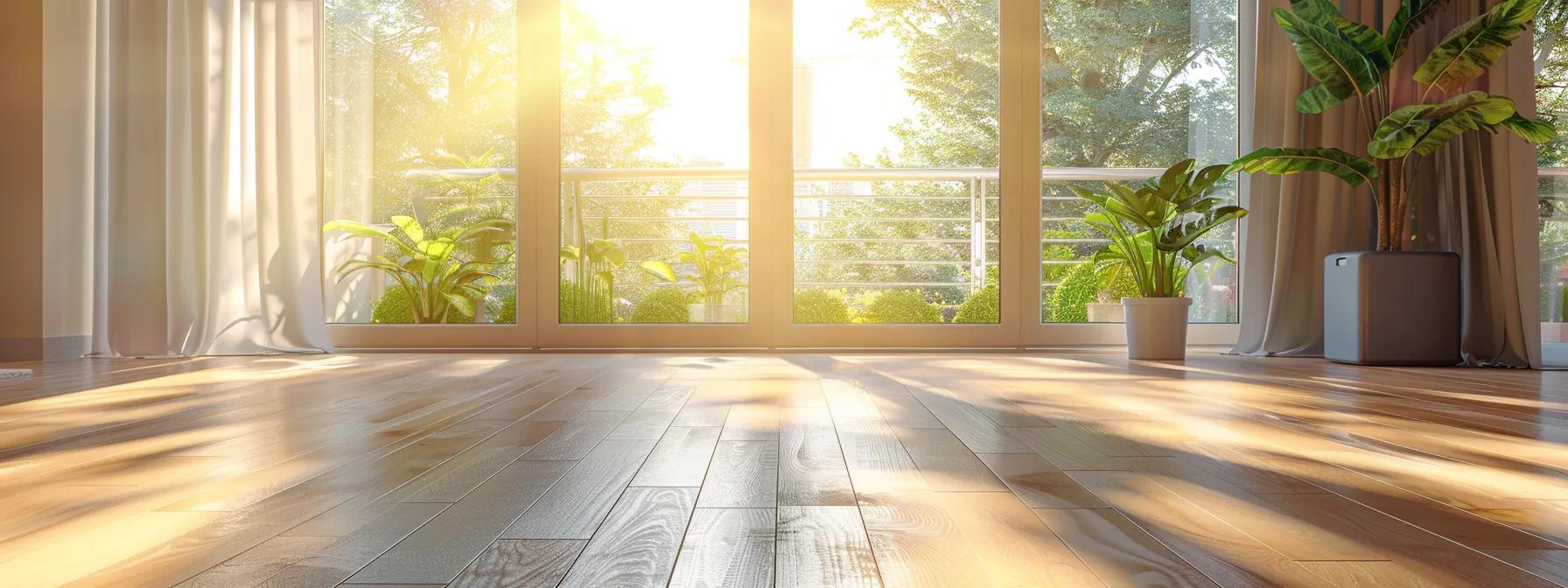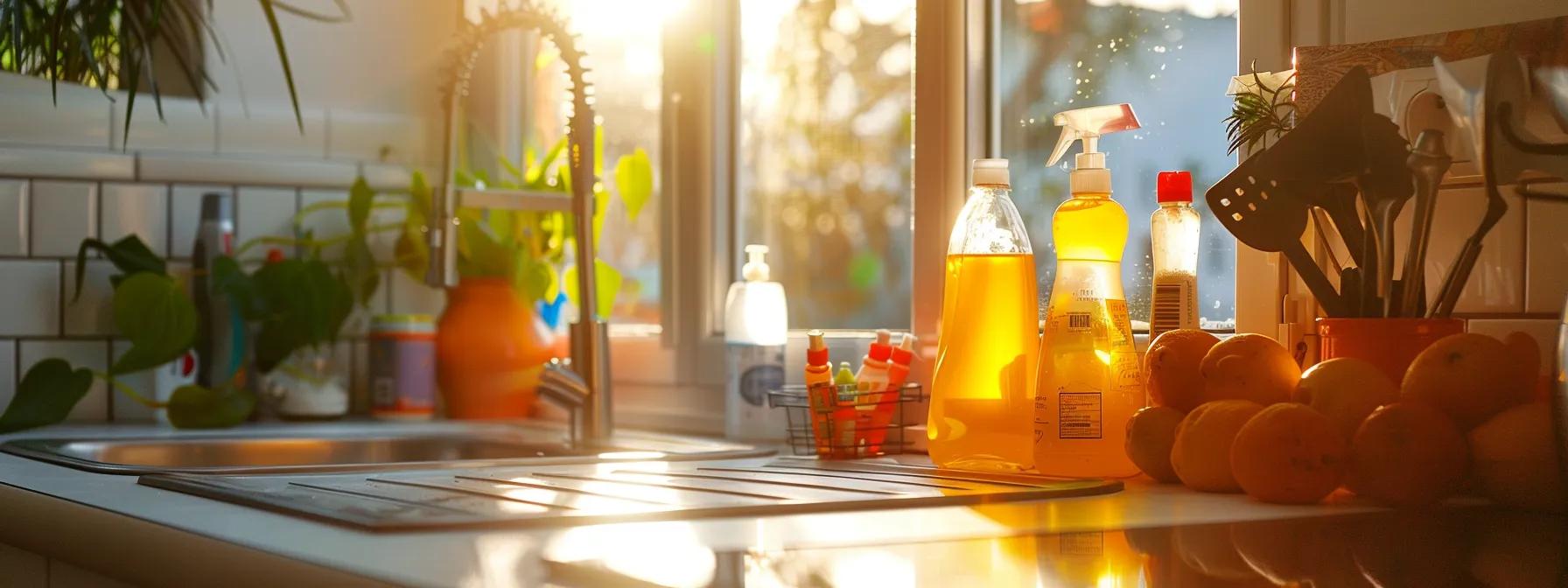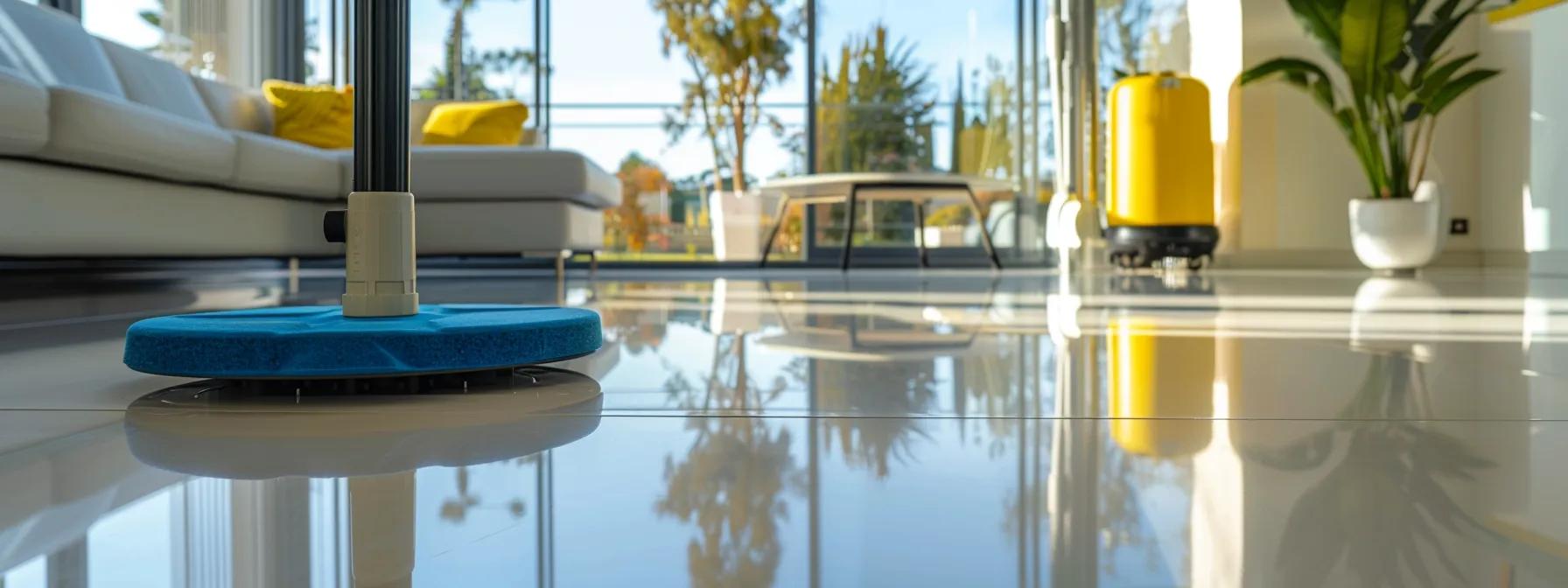Are harsh chemicals in window cleaners a concern for your home or office? Alliance Cleaning Services presents a simple homemade window cleaner recipe using everyday ingredients like water and vinegar. This guide explores the benefits of natural glass cleaning, the essential materials needed, and provides step-by-step instructions for achieving streak-free windows with microfiber cloths. By choosing a homemade solution, you ensure a safer environment and sparkling clean windows without the use of harmful chemicals. Discover how easy it is to maintain pristine glass surfaces naturally.
Key Takeaways
- homemade window cleaners effectively remove dirt without using harsh chemicals
- key ingredients include vinegar, rubbing alcohol, and dish soap for a streak-free shine
- proper storage in sealed bottles ensures the cleaner remains effective and safe
- using tools like squeegees and microfiber cloths improves cleaning results
- eco-friendly solutions help reduce environmental impact and lower household cleaning costs
Homemade vs Store-Bought Window Cleaner Comparison
How to Make a Homemade Window Cleaner Recipe
Creating a homemade window cleaner involves several straightforward steps. First, gather essential ingredients such as acetic acid and soap to form an effective cleaning agent. Next, prepare the cleaning solution by mixing these components in a spray bottle. Proper storage in a sealed bottle ensures longevity, while effective use tips enhance results. For tougher stains, eco-friendly alternatives offer robust cleaning options.
Gather the Necessary Ingredients
To create an effective homemade window cleaner, start by gathering distilled water, which helps prevent streaks and residue, ensuring a spotless finish. Incorporate rubbing alcohol to enhance the solution’s ability to evaporate quickly, reducing the chances of streaks forming. A small amount of dishwashing liquid acts as a surfactant, breaking down grease and grime for a thorough clean.
Enhance the cleaner’s performance by adding a few drops of oil and lemon. The oil helps to achieve a streak-free shine by providing a protective layer on the glass surface, while lemon offers a fresh, natural scent and additional cleaning power with its acidic properties. Combining these ingredients results in an environmentally friendly window cleaner that effectively tackles dirt without the use of harsh chemicals.
Prepare Your Cleaning Solution
To prepare the homemade window cleaner recipe, combine distilled water and rubbing alcohol in a spray bottle. Add a few drops of your preferred essential oil to infuse a fresh aroma into the solution. Shake the mixture well to ensure all ingredients are evenly distributed, creating an effective cleaning agent.
Once the solution is ready, apply it to the glass surface using a squeegee for a streak-free finish. For areas near the shower or other high-moisture zones, ensure the cleaner is thoroughly applied and wiped to prevent residue. Proper application techniques enhance the window cleaner’s performance, leaving windows sparkling without the need for harsh chemicals.
Store the Cleaner Properly
Proper storage of the homemade window cleaner is essential to maintain its effectiveness and safety. It should be kept in a tightly sealed spray bottle, away from direct sunlight and out of reach of children. Avoid mixing the cleaner with substances like ammonia or corn starch, as this can compromise its cleaning properties and potentially cause harmful reactions.
Labeling the storage container clearly with the contents and usage instructions is recommended to prevent accidental misuse. Utilizing materials such as a paper towel to affix the label ensures durability and readability. Additionally, keeping the cleaner in a cool, dry place, such as a utility closet near the mirror, helps preserve its integrity and ensures it remains ready for use when needed.
Effective Use and Application Tips
To maximize the effectiveness of the homemade window cleaner, it’s essential to address dust before applying the solution. Start by lightly dusting the window surfaces with a dry cloth or paper towel to remove loose particles. This initial step ensures that the cleaner can work directly on stubborn spots without interference from excess dust:
| Step | Description |
|---|---|
| 1. Dust the Surface | Use a dry paper towel to remove loose dust and debris from the window. |
| 2. Apply Cleaner | Spray the homemade window cleaner evenly across the glass. |
| 3. Wipe Clean | Use a paper towel or microfiber cloth to wipe the window in a circular motion for a streak-free finish. |
For areas that require extra attention, such as corners or edges, apply additional sprays of the cleaner and use a folded paper towel to reach tight spaces. This approach ensures that every part of the window is thoroughly cleaned, matching the effectiveness of commercial products like Windex without relying on harsh chemicals.
Eco-Friendly Alternatives for Heavy-Duty Cleaning
For homeowners seeking effective cleaning solutions in high-traffic areas like the kitchen and bathroom, finding alternatives to harsh chemicals like bleach is essential. A well-crafted homemade window cleaner recipe can address tough stains without the environmental impact, making it an ideal choice for maintaining both windows and surrounding surfaces:
- Utilize vinegar to dissolve grime and eliminate odors.
- Incorporate baking soda to tackle stubborn grease in the kitchen.
- Apply rubbing alcohol and lemon juice to remove ink stains effectively.
By adopting these eco-friendly alternatives within your window cleaning regimen, you ensure thorough hygiene and clarity without relying on potentially harmful substances. This approach not only enhances the cleanliness of your windows but also contributes to a safer and healthier home environment.
Benefits of Using a Homemade Glass Cleaner
Homemade glass cleaners offer health benefits by eliminating harsh detergents and acids, ensuring a safer environment. They also reduce environmental impact with natural, food-safe ingredients and are more cost-effective than store-bought products. Safety is enhanced through the use of everyday items like towels and newspaper, making window cleaning simple and secure.
Health Advantages of Chemical-Free Cleaning
Using a homemade window cleaner eliminates exposure to toxic chemicals often found in commercial disinfectants. This reduction in toxicity promotes a healthier indoor environment, especially for households with children or individuals with sensitivities. By choosing a mineral-based mixture, homeowners can effectively clean their windows without compromising their well-being.
Chemical-free cleaning solutions also prevent unpleasant odors associated with harsh cleaning agents. Instead, natural ingredients provide a fresh and clean scent, enhancing the overall atmosphere of living spaces. This approach not only ensures a sparkling finish but also maintains a safe and odor-free environment for everyone.
Environmental Impact of Homemade Solutions
Homemade window cleaners lessen the environmental footprint by using simple, measurable ingredients like teaspoons and tablespoons, ensuring only the necessary amounts are utilized. This careful measurement reduces the release of excess chemicals into the environment, effectively combating water pollution and promoting sustainability. Additionally, by avoiding the production and disposal of commercial cleaning bottles, less plastic waste is generated, benefiting overall environmental health.
These eco-friendly solutions efficiently tackle dirt and lint on glass surfaces without relying on harsh substances that can harm wildlife and ecosystems. Similar to environmentally conscious laundry practices that minimize chemical use, homemade window cleaners enhance cleanliness while preserving the environment. This approach supports a cleaner, safer planet by reducing the reliance on industrial cleaning products that contribute to environmental degradation.
Cost Comparison With Store-Bought Cleaners
Choosing a homemade window cleaner significantly reduces household expenses compared to purchasing multiple store-bought products. Ingredients like isopropyl alcohol and dish soap are inexpensive and versatile, allowing homeowners to tackle not only window cleaning but also grease removal and general household maintenance without the need for specialized cleaners. This economical approach means fewer purchases of separate items such as drain cleaners, ultimately lowering overall cleaning costs.
Additionally, homemade solutions contribute to better health by eliminating the need for harsh chemicals found in commercial cleaners. By using safe ingredients like vinegar and isopropyl alcohol, households can maintain a clean environment without compromising air quality or exposing family members to toxic substances. This healthier alternative not only safeguards well-being but also proves to be a cost-effective choice in the long run.
Safety Considerations When Cleaning Windows
When using a homemade window cleaning solution, it is important to handle all liquids with care to avoid skin irritation or accidental ingestion. Ingredients like lemon juice can be potent, so wearing gloves is recommended to protect hands during the cleaning process. Additionally, ensuring proper ventilation in the area helps to mitigate any strong odors from the natural juices used in the mixture.
To prevent potential stains on surrounding surfaces, it is advisable to apply the cleaning solution carefully and use tools such as a squeegee or microfiber cloth for precise application. Before spraying, vacuum any loose dirt or debris to minimize the risk of scratching the glass. These safety measures ensure a thorough and safe cleaning experience without the hazards associated with chemical cleaners.
Natural Ingredients for Effective Window Cleaning
Vinegar serves as a powerful natural ingredient, baking soda as a stain remover and deodorizer, and essential oils for fragrance and antimicrobial properties. This environmentally friendly mixture supports effective housekeeping without chlorine. These components are essential for crafting a safe and efficient window cleaner. For more information, contact via the provided email address.
Vinegar: A Powerful Natural Ingredient
Vinegar is a versatile ingredient commonly found in the pantry, making it an accessible choice for homemade window cleaners. Stored in a plastic bottle, vinegar can easily be mixed with other natural components to create an effective solution that cleans glass surfaces without leaving streaks. Its ability to break down grease and grime also makes it suitable for cleaning stainless steel fixtures around windows, ensuring a spotless and polished finish.
When applied with a brush, vinegar-based cleaners can effectively reach corners and edges that are difficult to access, providing a thorough clean. This method is not only useful for household windows but also extends to cleaning car windows, removing stubborn spots and enhancing visibility. By incorporating vinegar into the cleaning routine, Alliance Cleaning Services ensures that every window, whether in a residential setting or on a vehicle, achieves a clear and pristine appearance.
Baking Soda: Stain Remover and Deodorizer
Baking soda serves as an excellent stain remover by effectively breaking down soil and eliminating stubborn residues without damaging the glass. Its gentle abrasive nature ensures that starch and other tough stains are lifted, leaving windows crystal clear and spotless.
In addition to its stain-fighting capabilities, baking soda acts as a powerful deodorizer, neutralizing unpleasant odors and enhancing the overall freshness of the cleaning solution. When mixed with apple cider vinegar, the combination creates a potent formula that tackles both grime and lingering smells, allowing users to achieve a thorough clean with just a sponge:
| Step | Description |
|---|---|
| 1. Mix Ingredients | Combine baking soda and apple cider vinegar in a spray bottle. |
| 2. Apply Solution | Spray the mixture evenly onto the window surface. |
| 3. Wipe Clean | Use a sponge to scrub away soil and stains, then dry with a microfiber cloth. |
Essential Oils for Fragrance and Antimicrobial Properties
Essential oils not only provide a pleasant fragrance reminiscent of a delightful dessert but also offer antimicrobial properties that enhance the effectiveness of the homemade window cleaner. Using a funnel to add these oils ensures precise measurements, contributing to a well-balanced and effective cleaning solution.
During Christmas, infusing window cleaners with scents like peppermint or citrus can bring festive cheer while ensuring cleanliness. Essential oils, when combined with other cleaning tools such as mops or hoses for comprehensive household maintenance, deliver both a fresh aroma and hygienic surfaces, making the cleaning process efficient and enjoyable.
Step-by-Step Instructions for Cleaning Windows Naturally
Preparing the area involves clearing the sink and window sill to ensure unobstructed access. This setup prevents streaking and promotes an efficient cleaning process.
Employing hydrogen peroxide helps achieve a spotless finish, while tools like steel squeegees and microfiber cloths enhance the window cleaning effectiveness.
Prepping the Area for Cleaning
Before applying the homemade window cleaner, it is essential to remove any abrasive materials from the cleaning area to prevent scratches on the glass surface. Ensuring that the windows are free from dust and debris created by everyday activities, such as using a washing machine nearby, allows the cleaning solution to work more effectively. This preparation step enhances the overall cleanliness and longevity of the window surfaces.
Additionally, avoid using laundry detergent or other harsh chemicals that can leave residues or interact negatively with the homemade solution. Instead, opt for gentle cleaning agents like hydrogen peroxide, which safely break down grime without compromising the glass integrity. Properly prepping the area ensures that the window cleaning process is efficient and achieves a streak-free, sparkling finish.
Techniques for Streak-Free Finishes
Achieving streak-free window finishes involves the use of effective solvents and meticulous wiping techniques. By adding apple cider vinegar to the cleaning solution, debris such as dust and grease from kitchen activities, like those involving chicken preparations, are easily removed. Alliance Cleaning Services recommends using a microfiber cloth to ensure that no residue is left behind, similar to how one might clean crumbs off a carpet for a spotless appearance.
Proper drying methods are essential for a clear, streak-free look. After applying the homemade cleaner, use a squeegee to evenly spread the solution, preventing water marks and ensuring a smooth finish. The following table outlines these techniques:
| Step | Description |
|---|---|
| 1. Apply Cleaner | Spray the homemade solution evenly over the window surface. |
| 2. Squeegee | Move the squeegee in straight lines to remove excess cleaner without leaving streaks. |
| 3. Final Wipe | Use a microfiber cloth to buff the edges and corners, ensuring all moisture is removed. |
Tools to Enhance Your Window Cleaning
Using the right tools can significantly improve the efficiency of window cleaning. A high-quality nozzle on your spray bottle ensures a fine, even mist, allowing for thorough coverage without wasting any solution. Incorporating energy-efficient equipment, such as LED-lit squeegees, can enhance visibility and reduce power consumption during the cleaning process.
Additionally, organizing a regular maintenance schedule through a newsletter can keep homeowners informed about the best practices and new tools available. Simple additions like food coloring can help identify areas that need more attention, ensuring every window is spotless and gleaming.
| Tool | Purpose |
|---|---|
| High-Quality Nozzle | Provides an even spray for thorough cleaning |
| LED-Lit Squeegee | Enhances visibility and reduces energy usage |
| Food Coloring | Highlights areas needing extra cleaning |
Troubleshooting Common Window Cleaning Issues
Maintaining spotless windows involves tackling stubborn stains, preventing streaks and residue, and handling seasonal cleaning challenges. Whether dealing with paint splatters, bacteria buildup, hard water spots, or aligning window care with your interior design, effective troubleshooting ensures pristine results. The following sections offer expert solutions to these common window cleaning issues.
Dealing With Stubborn Stains
When facing stubborn window stains, using a mixture of apple cider vinegar and tap water can effectively break down persistent grime. By gently heating the solution, similar to techniques used in cooking, the cleaner’s potency increases, allowing it to penetrate and remove tough residues with ease. This method ensures windows remain clear and spotless without relying on harsh chemicals.
For particularly resilient stains, incorporating arrowroot powder into the homemade cleaner provides additional abrasive action without scratching the glass surface. Before applying the solution, using a vacuum cleaner to eliminate any loose dirt ensures that the cleaner can focus directly on the stubborn spots, enhancing overall effectiveness. This targeted approach helps achieve a pristine window surface, even in areas with long-standing marks.
Preventing Streaks and Residue
Preventing streaks and residue is crucial for achieving crystal-clear windows, especially when dealing with sensitive surfaces like marble. Adding a small amount of vodka to the cleaning solution can help break down stubborn marks, ensuring a spotless finish without any lingering traces:
| Step | Description |
|---|---|
| 1. Apply Cleaner | Spray the vodka-infused solution evenly across the window surface. |
| 2. Spread Evenly | Use a clean spoon or squeegee to distribute the cleaner uniformly. |
| 3. Wipe Dry | Buff the window with a microfiber cloth to eliminate any streaks. |
Additionally, maintaining a clutter-free bedroom by keeping plants away from windows can prevent accidental spills and ensure that your homemade cleaner works effectively. By implementing these simple strategies, Alliance Cleaning Services guarantees a flawless and residue-free appearance for all your windows.
Managing Seasonal Window Cleaning Challenges
Managing seasonal window cleaning challenges requires adapting to the specific conditions each season brings. During spring and summer, extensive gardening activities can result in pollen and sap buildup on windows, necessitating a powerful homemade cleaner to achieve crystal-clear surfaces. Additionally, safely using a ladder becomes essential when cleaning higher windows, especially as varying weather conditions can make the task more demanding.
In autumn and winter, windows often accumulate hard water spots and coffee stains from indoor activities, which can cloud the glass if not properly addressed. Utilizing eco-friendly cleaning solutions not only removes these stubborn marks but also preserves the window’s integrity. Homeowners can find expert advice and innovative cleaning techniques through the internet, ensuring their windows remain spotless throughout the year.
Exploring Alternative Homemade Cleaners
This section explores alternative homemade cleaners, including a vinegar-based glass cleaner recipe, a rubbing alcohol solution, and a dish soap mixture for glass surfaces. Tools like a toothbrush and broom can aid in application.
Adding peppermint oil provides a fresh scent, and using a bucket ensures safe mixing, preventing unwanted chemical reactions. These methods offer effective, safe cleaning options.
Recipe for a Vinegar-Based Glass Cleaner
Creating an effective window washing solution recipe with vinegar is simple and highly efficient. This homemade window washing solution combines distilled vinegar and water, making it one of the best natural glass cleaners available. Users often provide positive feedback on its streak-free results and eco-friendly composition:
- 1 cup distilled vinegar
- 1 cup water
- 1 tablespoon lemon juice (optional for added cleaning power)
- A few drops of essential oil for fragrance
This homemade window washing solution for squeegee use ensures a clear, polished finish by allowing quick drying and minimal residue. Employing this recipe not only reduces reliance on commercial cleaners but also promotes a healthier living environment. Proper application techniques, like using a squeegee, enhance the cleaner’s effectiveness, providing professional-quality results every time.
Creating a Rubbing Alcohol Solution
Incorporating rubbing alcohol into a window cleaning solution diy significantly boosts its effectiveness by enabling faster evaporation and reducing streaks. This ingredient plays a crucial role in creating the best homemade glass cleaner, ensuring that windows achieve a clear and spotless finish without the residue often left by commercial products.
The versatility of a rubbing alcohol-based homemade window cleaning solution extends its use beyond just windows, making it an ideal choice for a shower door cleaner diy and even a homemade eyeglass cleaner. Its powerful degreasing properties effectively remove grime and fingerprints, providing a thorough clean for various glass surfaces while maintaining their clarity and shine.
Dish Soap Mixture for Glass Surface Cleaning
A dish soap mixture serves as an excellent home remedy for cleaning windows, effectively cutting through grease and grime. By combining a few drops of dish soap with water, one can create a natural cleaner for windows that is both efficient and easy to use. This non toxic window cleaner is a safe alternative, making it one of the best non toxic window cleaner options for maintaining spotless glass surfaces.
Using a natural window cleaner recipe that includes dish soap enhances cleaning performance without the need for harmful chemicals. The combination not only ensures a streak-free shine but also promotes a healthier indoor environment. As one of the best non toxic window cleaners, this dish soap mixture offers a reliable solution for achieving crystal-clear windows safely.
Frequently Asked Questions About Homemade Cleaners
Learn how long an environmentally friendly window cleaner lasts and whether natural window cleaners are safe for all glass types. This section also highlights what to avoid when creating your window cleaning solution recipe.
Discover the best homemade window washing solution to ensure spotless, chemical-free windows while maintaining effectiveness and safety.
How Long Does Homemade Cleaner Last?
Homemade glass cleaner DIY solutions, including the glass cleaner recipe vinegar, typically remain effective for up to two weeks when stored properly. Ensuring the mixture is kept in a tightly sealed container and stored in a cool, dark area helps maintain its cleaning strength and prevents degradation.
- Use an airtight spray bottle to prolong freshness.
- Store away from direct sunlight to prevent evaporation.
- Label the container with the preparation date for easy tracking.
For a glass cleaner with vinegar recipe, preparing smaller batches can ensure that the solution stays fresh and performs optimally. Regularly making fresh batches not only enhances cleaning efficiency but also guarantees that the ingredients remain potent for a sparkling clean finish every time.
Are Homemade Cleaners Safe for All Glass Types?
Homemade window cleaners are generally safe for a wide range of glass types, including standard residential and commercial windows. By using natural ingredients like vinegar, baking soda, and essential oils, these cleaners effectively remove dirt and grime without leaving harmful residues. This ensures that the glass surfaces remain clear and undamaged, providing a streak-free shine.
However, certain specialized glass types, such as tinted or treated glass, may require extra care when using homemade cleaning solutions. It’s advisable to perform a small patch test in an inconspicuous area before applying the cleaner to the entire surface to ensure compatibility:
| Glass Type | Suitable Cleaning Method |
|---|---|
| Standard Clear Glass | Homemade vinegar and water solution |
| Tinted Glass | Gentle, non-abrasive cleaners with a patch test |
| Tempered Glass | Mild homemade cleaners to avoid weakening |
| Mirrored Glass | Non-ammonia-based homemade solutions to protect coating |
For specialized glass types, consulting with professionals ensures that the cleaning methods used do not compromise the integrity or appearance of the glass. Alliance Cleaning Services offers tailored cleaning solutions that cater to the unique needs of different glass surfaces, maintaining both cleanliness and safety.
What to Avoid When Making Homemade Cleaning Solutions
When creating homemade cleaning solutions for windows, it is important to avoid using abrasive materials such as steel wool or gritty scrubbing pads. These can scratch the glass surface, leading to permanent damage and reducing the clarity of your windows.
Avoid mixing incompatible ingredients like vinegar and bleach, as this can produce harmful fumes and diminish the effectiveness of your cleaner. Ensuring that only safe, compatible components are combined will maintain the integrity and safety of your homemade window cleaning solution:
| Avoid | Reason |
|---|---|
| Steel wool | Can scratch and damage glass surfaces |
| Vinegar and bleach | Produces toxic fumes and reduces cleaning effectiveness |
| Excessive essential oils | May leave a sticky residue on windows |
Additionally, refrain from using excessive amounts of cleaning agents, as this can lead to streaks and a film residue on the glass. Measuring ingredients accurately ensures a balanced solution that cleans effectively without leaving unwanted marks.
Frequently Asked Questions
What ingredients are needed for a homemade window cleaner?
Alliance Cleaning Services recommends a simple homemade window cleaner using equal parts white vinegar and water, a few drops of dish soap, and a slice of lemon. This blend effectively removes dirt and leaves windows sparkling clear.
How does homemade glass cleaner compare to store-bought options?
Homemade glass cleaners, typically using vinegar and water, are eco-friendly and budget-friendly. In contrast, store-bought cleaners often include specialized ingredients for a streak-free shine. The choice depends on your preference for natural ingredients versus convenience and performance.
Can natural cleaners effectively remove window streaks?
Yes, natural cleaners like vinegar and water effectively remove window streaks. They provide a spotless shine while ensuring a safe, eco-friendly environment without the use of harsh chemicals.
What steps should I follow to clean windows naturally?
To clean windows naturally, mix equal parts white vinegar and water. Spray the solution, then wipe with a microfiber cloth or newspaper for a streak-free shine. Regular cleaning maintains clarity and brightness.
How to fix common problems when cleaning windows at home?
To fix common window cleaning issues at home, use a mixture of water and dish soap, avoid direct sunlight to reduce streaks, apply a microfiber cloth for a spotless finish, and ensure your squeegee is clean for optimal results.
Conclusion
Creating a homemade window cleaner recipe offers a safe, cost-effective alternative to commercial products by utilizing natural ingredients such as vinegar, baking soda, and essential oils. These solutions provide a streak-free, sparkling finish while promoting a healthier indoor environment by eliminating exposure to harmful chemicals. Additionally, homemade cleaners reduce environmental impact by minimizing the use of plastic bottles and avoiding toxic substances. Embracing this approach ensures clean, clear windows and supports both personal well-being and sustainability.




